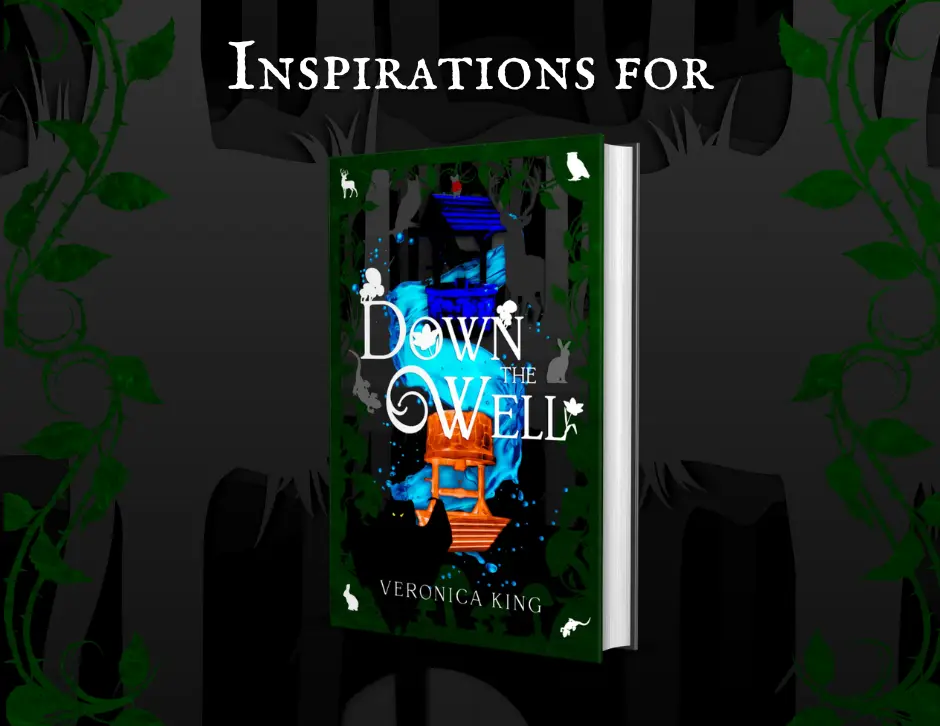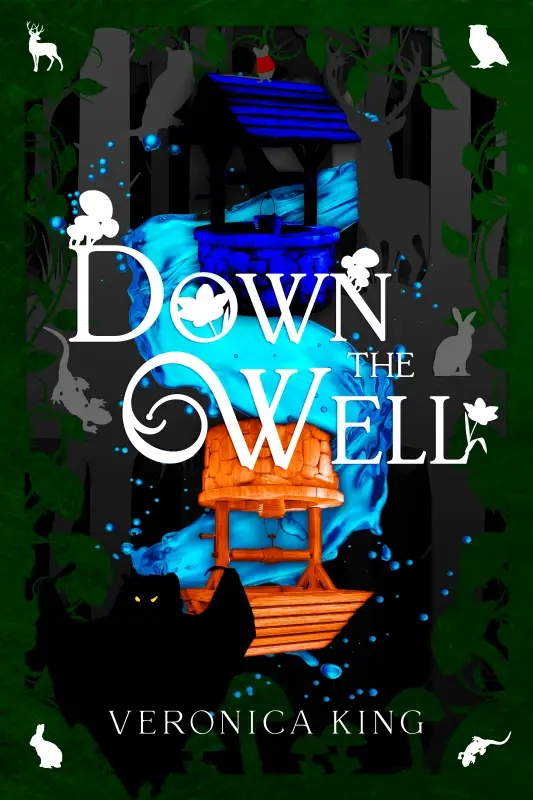in·spi·ra·tion
/ˌinspəˈrāSH(ə)n/
noun
1. the process of being mentally stimulated to do or feel something, especially to do something creative.
Some wait for it to suddenly appear before picking up the paintbrush, putting fingers to the keyboard, or picking the color of thread for their needle. Others create regardless of if inspiration decided to show up for the day. When narrowing down what inspired me to write Down the Well, I think it’s important to note that it’s excruciatingly hard to catch the lighting of creative pursuit, and shove it into something as fragile as a glass bottle.
When the idea for Down the Well sparked, I was a full-time student, working, maintaining a relationship, and trying to shed light on the shadows of my past. When thoughts for how I wanted readers to first set foot into the world of Thimbleton truly ignited, I was a college graduate, first time mother, and wife. So, the crafting of this story was not a linear process and evolved as I did. There was no dartboard I was aiming at with hopes of getting a bullseye, nor was there an elaborate strategic play of planning that could ever embody the world of Thimbleton or all the stories she keeps.
The only way I can think of that embodies how the story came to be is a patch-work quilt. Like the ones that hang on the backs of couches and thrown over the arms of rockers in cozy Appalachian homes.
Eventually, I didn’t want to wait any longer to tell this story to myself. So, during NaNoWriMo of 2019, I showed up every day with my needle and thread, regardless if inspiration came with me, ready to stitch together the many pieces of cloth supplied by my muses. Each square of fabric is its own hue, texture, and pattern. So, instead of explaining every patch on this quilt, I’ll dive into the magic of the most reoccurring squares.
Click the arrow next to each color to see how it inspired Down The Well:
Crossing Green
*all links in this section are affiliate
Before Tom Nook and friends took homes by storm in Animal Crossing: New Horizons during the “Great Panini” (what many content creators and streamers called the pandemic to avoid their content being flagged), he made the most of the GameCube in the early 2000s. I remember playing Animal Crossing (the original from 2001) years after its initial release. While my cousins were busy playing Super Smash Bros Melee, I was busy thinking about how a human could live among animals.
I remember taking notes in crayon with all the questions I wanted answered.
- Why was my playable character the only human?
- What happened to the other people?
- Is Tom Nook evil?
- Is there an end to the game?
- If I beat the game, does the human go free?
- And does the human like it better among the animals or people?
As you can imagine, my older cousins didn’t have the answers, and my aunt didn’t have the answers. My list of burning questions left unanswered.
Years later, when Animal Crossing: New Leaf was released in 2012, I didn’t get it. Mainly because my comfort games held me in their safety nets. However, when I did get it, the timing couldn’t have been better. I was able to enjoy something again, and I loved seeing some of my favorite villagers like Lobo, Goldie, and Bob the cat. It was like seeing my old friends that I had missed so much.
On my breaks at work and in between customers, I’d doodle little animals in clothes and imagine up a world that they’d belong in. I thought of my questions in crayon and decided I didn’t have all the answers, but I could weave a story to answer some of them. One thing remains absolute since that moment: I started to prefer the company of animals over people.
Traumatic (Storm) Gray
I’ve not been shy about sharing bits of my past on the platforms I use. It’s taken a lot for me to get to this place of sharing, but I know it’s important. So, before reading further know I’ll be sharing some personal pieces that some could see as heavy (emotional and physical abuse, including sexual assault). No matter how hard I try, my life experiences will bleed into my stories and shape my characters in some way or another. If you need to skip this part, please do so, but the last paragraph is lighter(?) in comparison and is about not fitting in.
In the starting chapters, you, the reader, will see the harmful relationship my heroine has with her parents.
It’s important to make the distinction that the way her parents harm her is not a direct mirror of how my parents influenced me.
My father wasn’t an alcoholic like my main character’s father is. I know about alcoholism because of how rampant it is in the Appalachian region and my extended family’s ties to the disease of addiction.
My mother never threw me under the bus like Lore’s mother does in this story. My father never had a direct role in my harm. It was his inaction as a parent that allowed others to harm me. My mom was dismissive, and I found myself parenting both of my parents at multiple points growing up. I now have no contact with my father, and as far as my mom goes, I like to think we are working on things together.
So, while Lore and her parents don’t have a healthy relationship at all, I thought it was important to draw those lines. Again, what Lore’s parents do in this book is not what my parents did. They love me, but they love me the only way they know how to, and it’s something that, as of writing this, I am coming to terms with. It’s easy to write those who hurt us into a villain, but the way I see it: Sometimes our parents traumatize us without knowing or without intending because they didn’t resolve some form of trauma that shaped them. Maybe they didn’t even know it was there. Now, with that being said, intent has nothing to do with the real effect. As a parent myself, I am constantly trying to reflect, feel, and release so my children don’t feel the strong residue of trauma that I went through. My parents could have chosen to do that, but they chose the path they thought was best. And for that, I have no anger towards them.
Another bit of my personal trauma that rears its head in this novel is the power dynamic between a male person in a high position and a younger female who is just trying to navigate how to safely get out of a situation but against all her wants and wishes is tied to this older man who doesn’t have the best intentions for her. I have shared that I have been sexually assaulted, and it was somewhere that I should have been safe. I hesitate to name the individual because of the beloved and perfect image he holds within my community and family back in Ohio. This is a piece of trauma I am still wrestling with actively. It’s hard when it feels like the people around you would try to find some loophole for the individual instead of holding people accountable. I was fifteen.
To wrap up this section, I’d like to lightly touch on the feeling of not belonging. This is a feeling I know many have felt to varying degrees. And while I’m not sure if it’s as traumatic as the previous points I have dealt with, being an outcast is something I connect with and has impacted me in a way that also influenced the story.
I have never felt like I truly belonged anywhere, and that could have something to with my parents divorcing at such a young age, the fact I found it hard to make friends, or my interests were always just a bit “odd.” I could put on a mask and become what people thought I should have been, said what they wanted, and I could talk to just about anyone when I did those things.
It took a lot of time before I felt connected to someone. In this first book, I think I tried to explore what being an outsider felt like. To also reinforce that no matter where you may drop in at, there is surely one other individual you can connect with.
Wonderland Blue
*all links in this section are affiliate
Like many of you reading this, I was a big fan of Alice in Wonderland. The animated Disney version fed my whimsical hunger I didn’t know I needed. I loved the bright colors that painted my world of gray. I loved the idea of singing flowers, a drink that made you shrink, and cookies that made you grow. My imagination flourished with this sort of influence as a young kid, and I found it quite comforting to escape in.
As a teen, the 2010 live-action film resurrected those strong feelings and unlocked emotions I thought I’d safely bottled away. It made me look at my fear of growing up and losing the little magic I was able to puzzle piece together from a rocky childhood. I didn’t want to have to say goodbye to all the rich memories I made and worlds I visited for a dull and unfulfilling adulthood. After watching the film for the first time, I started writing. Again. Turning back to an act of creativity that always brought me comfort. I didn’t finish any of the stories I started, but this reigniting of passion for story crafting carried me all the way through high school, and into and out of college. As of writing this, I can confidently say writing helped me never lose my sense of wonder.
While Down the Well has no direct hatter or white rabbit, I did pop in some easter eggs and I think when reading, readers will connect their own dots, and I’m sure the picture at the end will be different for each reader, as Alice’s Adventures in Wonderland means something unique to each person.
Down The Well
Lore Deoradán wants to be happy when she grows up. But navigating her parents' mercurial moods, moving to a new town just two weeks before her high school graduation, and dealing with her beloved grandma's declining health all make that dream seemingly impossible. Will her new job be the first step toward happiness, or will it be yet another disappointment?
When she falls down a well into a magical world with talking animals that haven't seen a human for years, she must clear her name of the mayor's murder. Although, how anyone believes she killed a Herculean-sized alligator is beyond her. Now, her survival is tied to a mouse with a chip on her shoulder. There's also a cat who owns a pub where the animal patrons might be cannibals, a giant snake librarian who probably wants to eat her, and sentient lampposts who are never there when you need them.
Can Lore prove her innocence, help a newfound friend save the town from a dark and dangerous schemer, and find her way home?
More info →








